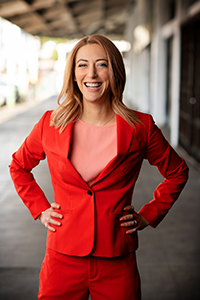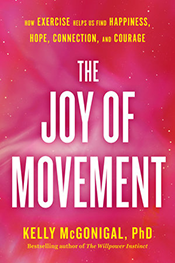 Today, psychologist and author Kelly McGonigal is going to share with you a radically different vision of what it means for an author to connect with readers and prepare for a book launch.
Today, psychologist and author Kelly McGonigal is going to share with you a radically different vision of what it means for an author to connect with readers and prepare for a book launch.
Her new book, The Joy of Movement, comes out in December, and she shares specifics on what she is doing and why. She also shares what having a viral TED talk with twenty million views, did (and didn’t) do for her career. Oh, she will also explain why she turned down an invitation from Richard Branson!
Highlights of our discussion are below, and you can listen to our entire conversation in my podcast by clicking ‘play’ below, or in the following places:
Here is some of the wisdom that Kelly shared in our conversation:
Turning Down an Invitation from Richard Branson
When I offhandedly mentioned that the result of a TED talk can be that you end up on a yacht with Sir Richard Branson, she said something astounding: “I did get an invitation from Richard Branson, but I turned it down.”
Who turns down Richard Branson?! Well, Kelly does. And her reasoning is inspiring:
“That wasn’t consistent with my goal. It wasn’t who I was or what I cared about. I wake up and my fantasy is that somebody will pick up one of my books or listen to an interview I do, and that single human being is going to have more hope as they go throughout their day, and deal with real-world challenges. That’s my dream. I feel like a lot of the trappings of creative success pulls you further away from that. Taking advantage of [an opportunity from Richard Branson] will not make me as happy as getting an email from somebody who says that my book, or something they heard in an interview help me feel more empowered to deal with something difficult.”
“I don’t want to scale”
So many authors feel pressure to increase the number of social media followers, or newsletter subscribers. In the process, they tend to ignore people right in front of them to reach for a bigger “audience.”
Kelly said every times she tried to do things that felt like “scaling up,” she found that as she got further away from being in a room with real people and directly helping, or producing something that only she can produce like her books, then the experience is not enjoyable.
“I don’t want to scale. You get further removed from the moment to moment experience that is actually meaningful.”
“Over the past few years, I have very consciously started turning down speaking opportunities that look amazing on their face. Instead of speaking to a thousand people I will never see again, I’d rather teach my dance class to people in my community, and construct a life where I do things that only I can do, and where I experience an immediate reward of connection.”
“Scaling up feels abstract, and I’m a concrete person. I want to feel what I did today had a visceral impact that I can sense on someone’s face or mood.”
Her Book Launch Strategy? Human Connection
Kelly has been a guest on the TODAY show multiple times, done those radio interview tours where you are interviewed by 100 stations in a 12 hour period, and so much more to promote her books.
But for her new book, she is taking a different path.
“Whatever it is people think you do for book promotion, I’ve probably done it. This time around, I am committed to doing events that are not solely about me and the book, and that give people opportunities to connect to people and resources in their community.”
“This book launch, I’m going out there as my full self, with everything that I love. I don’t think anyone has even seen that version of me yet. The version of me that is unabashedly enthusiastic about the content of my book.”
Kelly was very generous throughout the interview, telling me how my book, blog, and podcast helped give her permission to look at marketing differently. She put it this way: “Part of what your work gave to me was a sense of freedom of creating what I want — a dance party for the book event. I’m so excited for the book event.”
She explained how she is trying in an organic way to get her book to the people and communities who will make the most use of it: “A lot of what I’m trying to do is think, who can do something with this book? I know that is what makes my books successful in the long term, it is not the initial launch. I don’t do book launches that are about selling massive copies so that I can put ‘New York Times Bestseller’ on my tagline. I’m trying to create books that sell for years and years because they are helping people. My books will sell because people will find them useful, then give them to other people.”
Why Authors Can Be Their Own Best Publicist
A few weeks back, I shared my interview with Jessica Lahey, who described how she constantly sends out free copies of her own book to people. Kelly is approaching her upcoming book launch in the same manner. She and her publisher have already run out of pre-release copies to mail out, so she is planning to send her own once she can buy final copies of her book at publication:
“I feel like I’ve heard you say this before, and I find it to be true. Everyone thinks it’s better to have a formal publicity package sent out by your publisher, and I think the personal touch is much better. What I will probably do for this book is to write personal messages on a bookmark about what I hope the individual will enjoy or appreciate about the book, and a written card or note about what I appreciate about the work that they are doing. And just send it to them myself. That’s my plan. Get a discount from my publisher and buy a lot of books and mail them out.”
When I asked how she budgeted for this, her answer was incredible: “I don’t think of my writing as a business, even though it makes most of my income. Because it brings me so much meaning, I invest in it. I don’t have spreadsheets with budgets, I don’t want a marketing budget. What I want to do is make enough money as an author so that I can send people books. It’s totally backwards.”
The Best Tool Authors Have For Marketing: Gratitude
Kelly explains it this way: “Gratitude is an emotion that we think only makes us feel good but we know that gratitude is a social function to connect individuals and strengthen relationships. It is the easiest way to initiate a relationship or strengthen a relationship.”
She and I connected because she wrote me this amazing email thanking me for my book, blog, and podcast. When I asked about why she wrote me, she said that it was an assignment I had suggested in one of my blog posts! Funny how things come back around like that.
Kelly explains how she is thinking about marketing for this book: “I spent 2 days reading everything on your website. I was trying to re-engage with the idea of author branding. It seems like a good idea, but when you are actually in it, it can feel really gross. You had all of these amazing mindset shifts, like your article about the Radical Fake Homepage. I was talking about this to my husband: what would a website who actually represented who I am be like? You gave me a mindset reset that helped me engage in a way that has this sense of possibility.”
The Complexity of Collaboration With a Publisher
 I always encourage authors to seek out collaboration in their work, and in our interview Kelly talked about how she has done that to make her books even better. But she also talked honestly about the complexity of collaboration.
I always encourage authors to seek out collaboration in their work, and in our interview Kelly talked about how she has done that to make her books even better. But she also talked honestly about the complexity of collaboration.
For most of her books, she could not pick the cover or title. With her upcoming books, she described how she finally got the title and cover she wanted. What she has learned: “I’m more willing now to say ‘No, I know what this book is meant to make people feel, and I will fight for a cover and a title that communicates that.'”
In the interview, she describes the exact way that she worked with the publisher to create the cover and title of her new book.
What She Did (and Didn’t) Gain From Having a Viral TED Talk
When I asked about her experience having a viral TED talk with more than 20 million views, she said: “I am the great anti-spokesperson for the dream of giving a TED talk. My TED talk is one of the most viewed of all time, with over 20 million views. I had to be convinced to give it, for years TED emailed me asking if I wanted to do a talk.”
“I don’t know if it changed my life in any particular way. I was already publishing books, and had a book planned for the topic of my TED talk.”
The clearest direct outcome of the TED talk that she could point to? This: “When I was trying to get a mortgage, the broker had known about my TED talk.”
How She Became an Author
Kelly talks about how she became a writer by being so focused on teaching, and how that lead to book deals. “That is how my career as an author developed: I was just teaching people things I care about, and because I care so much about teaching and what I’m teaching and helping people, that it got attention.”
So much of what Kelly shared just inspired me. I encourage you to listen to the full interview via the links above.
You can find Kelly in the following places:
kellymcgonigal.com
Instagram: @kellymariemcgonigal
Facebook
Twitter: @kellymcgonigal
Her books:
Podcast: Play in new window | Download
Subscribe:

 Today, psychologist and author Kelly McGonigal is going to share with you a radically different vision of what it means for an author to connect with readers and prepare for a book launch.
Today, psychologist and author Kelly McGonigal is going to share with you a radically different vision of what it means for an author to connect with readers and prepare for a book launch.  I always encourage authors to seek out collaboration in their work, and in our interview Kelly talked about how she has done that to make her books even better. But she also talked honestly about the complexity of collaboration.
I always encourage authors to seek out collaboration in their work, and in our interview Kelly talked about how she has done that to make her books even better. But she also talked honestly about the complexity of collaboration.